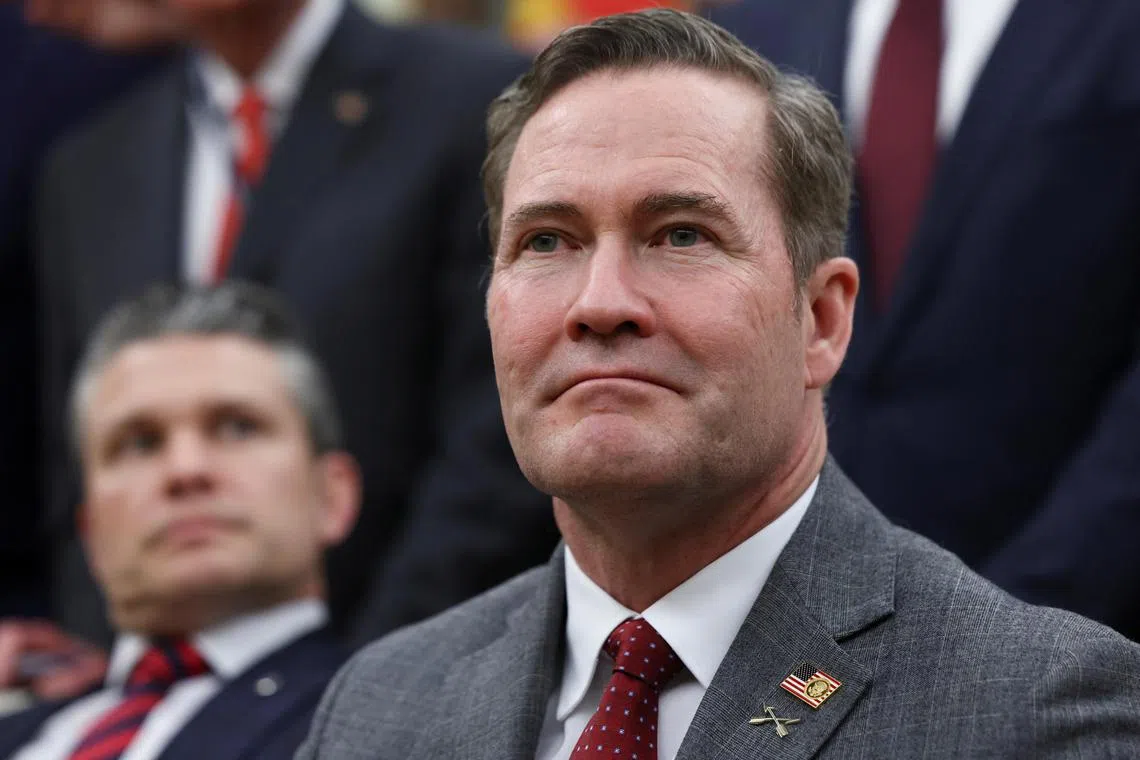Trump backs national security adviser after Yemen war security breach
Sign up now: Get ST's newsletters delivered to your inbox

A magazine journalist reported on March 24 that US national security adviser Michael Waltz had accidentally included him in a Signal messaging app discussion on highly sensitive war plans.
PHOTO: REUTERS
WASHINGTON - President Donald Trump expressed support on March 25 for his national security adviser, Mr Michael Waltz, after a magazine journalist said on March 24 that Mr Waltz had accidentally included him in a discussion of highly sensitive war plans on the messaging app Signal.
"Michael Waltz has learnt a lesson, and he's a good man," Mr Trump told NBC News, in a phone interview.
US senators were set to grill Mr Trump's top intelligence officials on March 25 about the apparent breach, which triggered outrage and disbelief among Democrats and national security experts.
Mr Jeffrey Goldberg, editor-in-chief of The Atlantic, said in a report on March 24 that Mr Waltz unexpectedly added him on March 13 to an encrypted chat group on the Signal messaging app
National Security Council spokesperson Brian Hughes said the chat group appeared to be authentic.
The White House said it was looking into how Mr Goldberg's number was added to the thread.
Democrats – and some of Mr Trump’s fellow Republicans – called for an investigation of what appeared to be a major security breach. Classified and sensitive information is not supposed to be shared on commercial mobile phone apps, and unknown numbers – such as Mr Goldberg’s – should not be included.
Members of the Senate Intelligence Committee were to question two of the administration officials on the chat – director of national intelligence Tulsi Gabbard and CIA director John Ratcliffe – on March 25 during the panel’s annual hearing on Worldwide Threats to US Security.
In his opening statement, Senator Mark Warner, the Democratic vice-chairman of the intelligence committee, said a military or intelligence officer who took similar action would be fired.
“Yesterday, we stunningly learnt that senior members of this administration, and according to reports, two of our witnesses here today, were members of a group chat that discussed highly sensitive and likely classified information that supposedly even included weapons packages, targets and timing and included the name of an active CIA agent,” he said.
White House press secretary Karoline Leavitt accused Mr Goldberg of sensationalising the story in a post on X and asserted that no war plans were discussed and no classified material was sent to the thread.
In his article, Mr Goldberg wrote that hours before the US launched strikes
His report omitted the details out of national security concerns, but Mr Goldberg termed it a “shockingly reckless” use of a Signal chat.
Security risks
It remained unclear why the officials chose to chat via Signal rather than the secure government channels typically used for sensitive discussions.
Signal has a “stellar reputation and is widely used and trusted in the security community”, said Mr Rocky Cole, whose cyber-security firm iVerify helps protect smartphone users from hackers.
“The risk of discussing highly sensitive national security information on Signal isn’t so much that Signal itself is insecure,” Mr Cole added. “It’s the fact that nation states threat actors have a demonstrated ability to remotely compromise the entire mobile phone itself. If the phone itself isn’t secure, all the Signal messages on that device can be read.”
Accounts that appeared to represent Vice-President J.D. Vance, US Secretary of State Marco Rubio, Mr Ratcliffe, Ms Gabbard, Treasury Secretary Scott Bessent, White House chief of staff Susie Wiles, and senior National Security Council officials were assembled in the chat group, Mr Goldberg wrote.
While some Democrats called for officials on the chat to lose their security clearances or resign, there was no immediate word on whether any official would face consequences.
White House officials and some fellow Republicans instead stressed that the attack on the Houthis had gone off without a hitch. REUTERS


